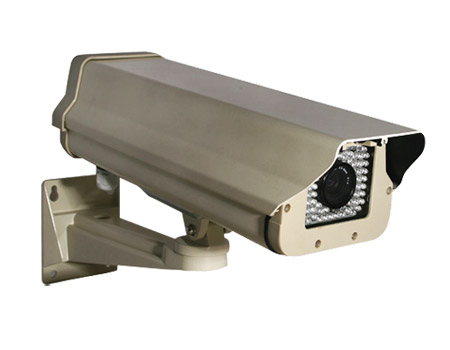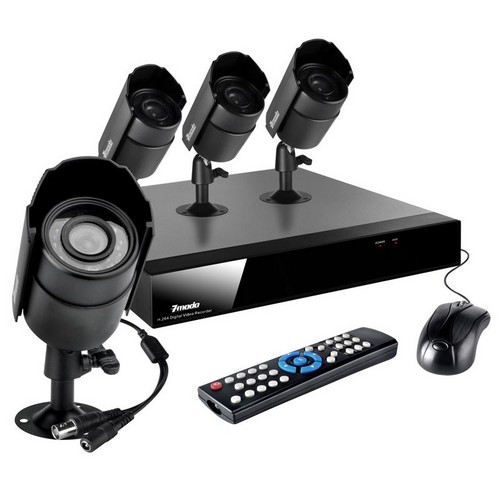Home Security Camera Systems...
a sure-fire deterrent
I want to show you the value of installing home security camera systems, together with an electric fence, as a first line of defense when it comes to your home security. There are a few obvious advantages to use electric fencing and home security camera systems together as a security barrier to your home. Together they act as:
- A physical barrier,
- A psychological barrier,
- An early warning system, and
- Recorded surveillance for analysis (immediate or later).
Just the fact that an intruder realises there are home security cameras (or closed circuit television) installed on your property, will be a definite deterrent.

Whenever an intruder has invaded your home, one immediately feels insecure..... it feels as if our sense of security and privacy has been taken away from us and that in the most sacred place of all, our own home.
That is why it is so important to have as many deterrents as possible to protect you and your family's safety.
This is where a properly designed and installed CCTV camera system comes into its own. Home security camera systems are no longer considered a luxury item. The cost has come down tremendously in the past few years and if you consider the increased level of security they provide, it is a no-brainer.
When the cameras are visible, they also serve as a psychological barrier for the intruder. This is probably one of the best advantages a home security camera system has. You are much less likely to be invaded by intruders if they spot the cameras. It will deter most people and send them off to look for some easier pickings.
OK, so now that we know why we should install a home security camera system (or a CCTV system as it is also commonly known), let's see how they work and then we use that knowledge to plan, select and design the system for your specific application.....
CCTV is an acronym for Closed Circuit Television. "Closed circuit" means it is an installation of directly connected equipment and nobody from outside the circuit has access to the data.
How does home security camera systems work?
A home security camera system consists of the following basic components:
- a CCTV camera
- a CCTV monitor (can also use a personal computer or laptop)
- a Video Recorder (analogue or digital, again a PC can be used)
- Peripheral equipment such as brackets and cabling
The camera (or cameras, as most homes will have more than one) picks up the images from the area it covers. These signals are then sent to the CCTV monitor (for visual monitoring), which is connected to the recorder where the images are stored.
This is the basics of the operation of a home security camera system and is all you have to know at this stage.
How do I select a system?

The first thing you must remember is that there are thousands of systems out there and instead of being overwhelmed by this prospect, rather think of it in this way....
With all the possibilities, you can now design a system that suits your needs perfectly.
Your system can be customised to your exact needs and requirements and adapted to your property size and layout.
The following are the options we have to consider in order for you to make the best possible choice for your specific requirement:
- Select between an analogue or a digital system,
- Select between wired or wireless equipment,
- Select between a Digital Video Recorder (DVR) or a PC.
To make it easier to choose, let's also look at what you would like to get from your system. For me, it is very important that the system provides the following:
- excellent quality pictures in broad daylight as well as at night,
- be easy to use,
- must be modular and flexible so that you can expand the system if required,
- provide playback of high quality recorded images.
I feel that with the technology available to us today, an analogue system is just not an option anymore. The picture quality is not nearly the same as with a digital system.
Furthermore, a digital system also has the following advantages:
- A digital system is more "user-friendly" with all the "plug and play" options available,
- A digital system is more flexible, especially since we all want remote access so that we can monitor our systems from afar.
- Digital cameras have a much higher picture resolution, which means that the quality of the recorded data is much better.
- Digital cameras have encryption build in, so no-one can "tap" into your system; it is secure.
- Digital systems have much better wireless reception as it is immune to interference from outside sources.
So, seeing that I have basically decided for you what system to use (wink wink), Let's move to the next step.
Seriously now. There are many arguments for and against the two types of systems. If you are technically inclined and you feel you want to make the decision based on your own research, the following is an excellent reference source to start from.
The first thing you should determine, before anything else, is how many cameras you will need. Decide on the following:
- Do you want to cover only your entrances?
- Do you want to keep on eye on the complete perimeter, or are there places you think are more vulnerable and rather just monitor that?
- Do you want your driveway to be under surveillance too?
These are the typical types of questions you should consider. Then while you are busy with the outside security, you may as well decide whether you need cameras inside the home too.
Maybe you want to monitor certain rooms inside your home? The kids playroom or the baby's crib maybe? Now is a good time to contemplate this.....
The next thing to decide on is whether to go wireless or wired. I personally have never installed a wireless system yet, as the technology was not that advanced when I installed my own system. But I have done a lot of research on the subject and nowadays I think I will recommend to go wireless.
The only thing that I am wary off is the fact that each camera still needs power. I am not so sure on how long rechargeable batteries will last if the camera is on 24/7. So, if you are like me, you will probably want to supply each camera with permanent power rather, which make the installation a bit more complicated again.
Now, let's look at how to do it...
Whether you decide to install your system yourself, and it is quite easy, or get professionals in to do it for you, there are a few pointers that will ensure hassle free use of the system for many years to come.
Always make 100% sure that it all complies to your local safety regulations.
I used to live in Cape Town and with the beautiful lifestyle that comes with this, there are a few disadvantages that goes with living so close to the sea. The one we are concerned about here is the salty air and corrosion. So please make sure that the components used will withstand the test of nature......
Even if you do not have the problems that comes from living close to the sea, I suggest that you still insist on using the best quality material you can afford. A properly installed camera system ensures the minimum of maintenance and it will last for many, many years.
Now that you know......
- which areas you want to cover,
- how many cameras you need and
- whether you will install a wireless system or not,
the following aspects must be kept in mind.
Each camera must be carefully placed in order to make sure the required area is visible and the clarity of the picture must be crystal clear.
Mount the bracket securely to the wall to ensure that the wind doesn't shake the camera and distort the picture.
Like I mentioned above, outdoor cameras should always have a weatherproof casing for protection. These casing also helps against tampering.
One further thing; I recommend that you install the cameras at least 3m above the ground, so that no-one can interfere with them.
If you have done all of the above, you will have lots of faith in your second line a defence?
Return from Home Security Camera Systems to Do It Yourself Home Security

New! Comments
Have your say about what you just read here! Please leave me a comment in the box below.